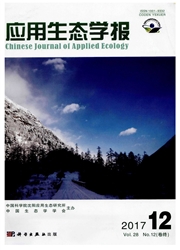

 中文摘要:
中文摘要:
生防菌通常可利用竞争、抗生、寄生和交叉保护等直接的拮抗机制抑制植物病害;同时某些生防菌还能促进植物生长,诱导植物对真菌、细菌和病毒引起的病害乃至对线虫和昆虫为害的抗性,称为诱导系统抗性(ISR).ISR具有非特异性、广谱性和系统性, 其在表型上与病原菌侵染激发的系统获得抗性(SAR)相似,具有同样的效率;但在寄主植物上不发生过敏性坏死反应(HR),无可见症状, 为发展和改善更加安全而环境友好的植物保护策略开辟了新的思路.本文总结了生防真菌和细菌诱导系统抗性及其激发子和信号转导途径等方面的研究进展,重点阐述了寄主防御反应的生化和细胞学机制,并对ISR在植物病害生物防治中的应用前景进行了展望.
 英文摘要:
英文摘要:
Microbial biocontrol agents (BCAs) are generally used for controlling plant diseases via antagonistic mechanisms including competition, antibiosis, parasitism, and cross-protection. Some BCAs can even promote plant growth, and provide induced systemic resistance (ISR), i. e. , induce the plants to have resistance against pathogens including phytopathogenic fungi, bacteria and virus, and in some cases, pest insects and nematodes. ISR is characterized by non-specific, wide spectrum and systemic. It is phenotypically similar to the systemic acquired resistance (SAR) induced by the infection of pathogens, and with the same efficiency but without hypersensitive response (HR) and visible symptoms in plant as SAR, which is helpful to open a new way to develop and improve safer and environmentally friendly strategies for plant protection. In this paper, the research advances on ISR mediated by biocontrol fungi and bacteria, elicitors or determinants, and signaling transduction pathways were summarized, with more emphasis on the biochemical and cytological mechanisms of host plant defense reaction induced by free-living and endophytic BCAs. The potential application of ISR in biocontrol of plant diseases was also discussed.
 同期刊论文项目
同期刊论文项目
 同项目期刊论文
同项目期刊论文
 期刊信息
期刊信息
